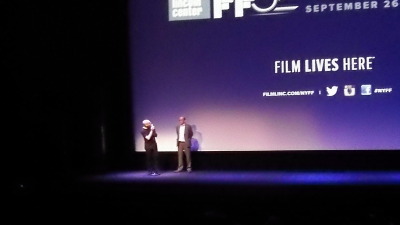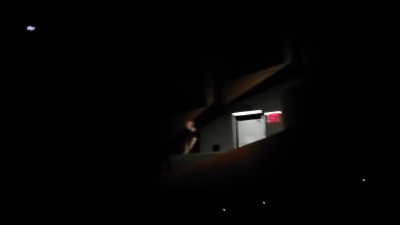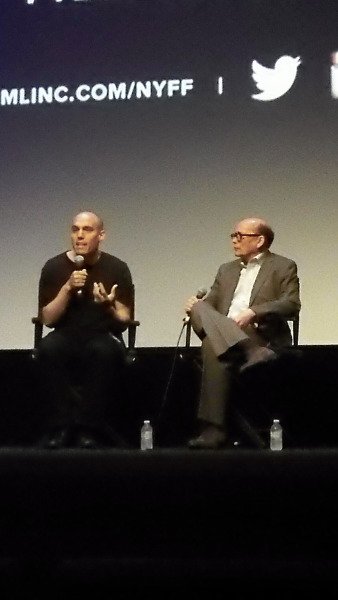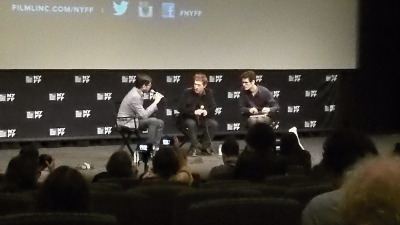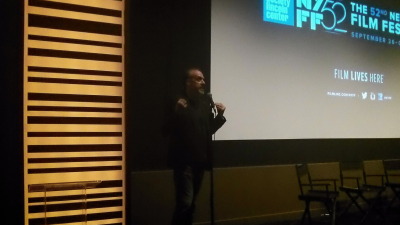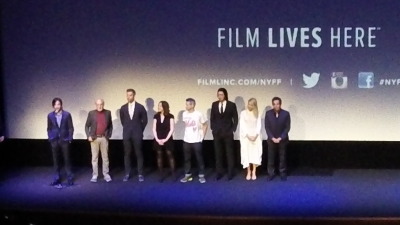"I've never gotten anything out of [Jean-Luc Godard's] movies. They have felt constructed, faux intellectual and completely dead. Cinematographically uninteresting and infinitely boring. Godard is a f**king bore. He's made his films for the critics. One of the movies, Masculin féminin: 15 faits précis
(1966), was shot here in Sweden. It was mind-numbingly boring."
-- Ingmar Bergman
If there's one thing that can be said about Godard's 3D art film
Goodbye to Language (
Adieu au langage), I didn't find it boring. It's frustrating, sure, and it's pretentious, it's ragged, it's non-narrative and non-linear; it namedrops like an insecure literature student, it's self-indulgent to the extreme, and it's at times too self-congratulatory about being self-aware, but it was never boring for me. In some ways
Goodbye to Language is the kind of movie that I like thinking about more than I liked watching it, because even if it doesn't say anything directly or overtly, there's something about trying to figure out what was trying to be said that can be fascinating.
The film is made up entirely of loosely connected fragments, with some trace of narrative attached to a pair of aloof French lovers who make observations out of ennui, with the man occasionally farting on the toilet. (I'd joked to a few people that
Goodbye to Language was the perfect cinematic recreation of the act of gawking at naked French women while audibly taking a s**t...
IN 3D!) There's also a dog who ponders philosophical ideas while walking along a riverbank. Is this a reference to pre-Socratics like Diogenes and Heraclitus, or does Godard just love his dog? (Is this even an important question?) There's also some crime of some sort, though it's hard to piece it all together. Any time a sense of narrative progression or a kind of hint at a logical syllogism is made in the film, Godard cuts away. He interrupts it with grainy footage of fire and crowds, or to a car driving down the road, or to another shot of the same scene with degraded image quality. Even a recurring piece of music is interrupted and then the excerpt repeated from the beginning, as if resetting the progress to start again continually.
Sometimes the film looks as if it was shot with iPhones or cheap digital camcorders, and other times it looks like it was shot with high-end digital cameras to capture sumptuous and evocative images, like Héloise Godet behind bars in front of the sea, or hands beside fallen leaves on the water. This leap back and forth between ugliness and beauty, and momentum and stoppage creates such an intense feeling of discontinuity that it can be disorienting in the extreme.
Goodbye to Language is alienating and even seems like its alternate title should be
F**k-Off to the Audience (i.e., the film as a punk or noise rock album), and that hasn't even gotten to what Godard does with 3D.
"Someone like Jean-Luc Godard is for me intellectual counterfeit money when compared to a good kung fu film."
-- Werner Herzog
The 3D in
Goodbye to Language is more novel and more fascinating than the 3D seen in most blockbusters (in which the 3D is generally superfluous), and yet it serves a form of discontinuity from what's expected from the conventions of stereoscopic 3D.
In a few scenes of the
Goodbye to Language, Godard splits the image on screen to expose the layers of stereoscopic viewing, with a completely different image in the left eye from what is seen in the right eye. Moments that are happening simultaneously in the space of the film are now shared on screen but split between the eyes. I found myself winking to isolate images, which became a fascinating way to engage with discontinuity and the viewing experience. The same sort of winking-to-watch occurred in some of the random shots of windshield wipers. The droplets in the foreground were split given their relative position to the cameras since the main focus of these shots was in the middle distance and beyond, and yet isolating the overlay in each eye made the shots less of a headache and more of an object to be considered in terms of my ideas about stereoscopic 3D images in general (i.e., this does not function like I'm used to it functioning, so what does this say about the object, in this case viewing a film?)
In a way, I think
Goodbye to Language is less about the whole and how it coheres overtly and more about these individual moments that stuck out in the fragments. They become like the moves or fight sequences in a kung fu movie, and they become these discrete areas of appreciation even in a messy whole. While there are clumsy moves made along the way (e.g., a character in the film comments on how much she detests characters in films while watching a film--ugh, how obvious), there are individual moves that are moments that can be grasped and considered closely even if just for their novelty, oddness, or beauty.
It could be asked what these moves that Godard is making are meant for, or if there is an intended end. If the film is a kind of farewell to language, the moves of the film and the intent of the film may be a kind of transgressive act against the grammar of cinema and language of narrative filmmaking. Those constant interruptions and resets of momentum are a means of letting individual sections exist as their own as discrete meditations on this cinematic language, which then, strung together, form this discontinuous series of propositions or comments on cinematic language and the act of communication through this form of language. Rather than thinking of
Goodbye to Language as a united throughout, like propositions in a syllogism, maybe the film is more like fragments of syllogisms that center around a hole that is all about the larger discourse we have through cinematic language.
"[Godard's] gifts as a director are enormous. I just can't take him very seriously as a thinker--and that's where we seem to differ, because he does. His message is what he cares about these days, and, like most movie messages, it could be written on the head of a pin. But what's so admirable about him is his marvelous contempt for the machinery of movies and even movies themselves--a kind of anarchistic, nihilistic contempt for the medium--which, when he's at his best and most vigorous, is very exciting."
-- Orson Welles
There's a major philosophical difficulty here when it comes to figuring out the exact sort of discourse that Godard may be engaging in. There are little hints of what you probably need to be into to get what Godard is getting at provided throughout the movie. Godard even (a bit smugly) includes a number of dead intellectuals and dead philosophers in the cast of the movie during the end credits like the endnotes of a cultural studies midterm.
I think the philosophical difficulty here is the result of multiple factors. One could be a kind of intellectual broadness rather than intellectual depth or intellectual clarity. There are ideas explored in snippets and pieces, but because
Goodbye to Language doesn't allow for the logical or rhetorical throughline, the ideas are simply tossed out there to delineate a sort of intellectual-who-knows-what that's more about sounding philosophical rather than doing philosophy. In this case, the issue would be throwing ideas out there without engaging the ideas in a meaningful way.
There's also a kind of limitation of cinematic language, which is unable to express complicated and abstract ideas. Film tends to be best at expressing the visual, the visceral, and the emotional through sound and images. Abstract ideas or large ideas themselves tend to be easier to delineate through written language or spoken language, which are their own kinds of discourses with their own kinds of conventions. Using cinematic language, Godard may be pointing out the limitations of cinematic language to express its own inability to explore things as written or spoken language could, and yet showing that odd ability for cinematic language to express something visually that may be evoked through written or spoken language. Like stereoscopic 3D, cinematic language can only wink at the larger and more complicated philosophical images, and it can only make sense of a portion of this abstract palimpsest.

It's the breaking of these conventions in unpalatable ways and a sense of absolute contempt for the audience that makes
Goodbye to Language a weird little mutant animal of a thing. I wonder what my response would be if I saw it in an art gallery, or if it was the work of some outsider artist. Similarly, I wonder what I would have thought about
Goodbye to Language if it were made by someone else--am I trying to engage with the film as an art object because of Godard's reputation from the 60s and 70s, or is there something in there that speaks of a cinematic bravura in the form of
F**k-Off to the Audience independent of any goodwill I have for Godard as an important figure in the New Wave? That may be part of the conversation around this film, like language delineating a hole that is either full of something or totally empty.
And yet while I'm trying to engage Godard's latest with as much intellectual rigor as I can muster, I know a lot of people will watch
Goodbye to Language and find it masturbatory, self-indulgent, bankrupt of ideas, and even, as Bergman said, boring. It can be in spots. At times Godard seems to be making this odd work of philosophical 3D outsider art, and at other times he seems to be making the Platonic form of a bad European art film.
But stereoscopic 3D seems like an ideal metaphor for these divergent kinds of opinions about
Goodbye to Language.
In one eye, it looks one way, and in another eye it looks another way. With both eyes open, it's a mess on the screen, visual noise we're trying to make some sense of or to appreciate in its own way. The cacophony of opinions is just another layer of language atop
Language, and maybe we just have to keep winking. Watching the movie, I'd rather the constant shifting between eyes than having not seen the film.
